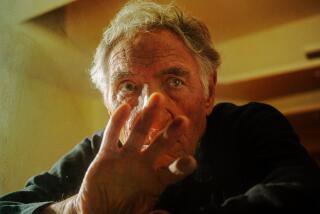The waning days of a bright star
- Share via
More than 80 years after her death, Sarah Bernhardt has not yet seen her final curtain call. The tempestuous actress was arguably the world’s first modern superstar, a proto-celebrity well before the advent of cinema would make such creatures commonplace. Imagine a Madonna capable of inspiring Oscar Wilde to pen “Salome” with her in mind and you get the idea. (Victorien Sardou’s “La Tosca” and Alexandre Dumas fils’ “La Dame aux Camelias” were intended for Bernhardt as well; Wilde also dedicated a rather awful poem to her.) Nicole Kidman will play Bernhardt in an upcoming Steven Spielberg film. Dozens of biographies and monographs and at least four novelistic accounts of her life have already been published, including a Peter Lovesey mystery in which Bernhardt helps the Prince of Wales solve a murder at the Moulin Rouge.
Add to this still-growing corpus “Divine Sarah” by Adam Braver, whose last book fictionalized an only slightly more illustrious and controversial figure -- Abraham Lincoln. To exhibit the depth of Bernhardt’s celebrity, Braver opens with her 1880 American debut. The final scene of “La Dame aux Camelias” draws to a close on a New York stage as Bernhardt, at the height of her powers, mimes the tubercular death of Marguerite Gautier. “Is it a thunderstorm?” Braver coyly wonders. “The crashing of waves?” No, silly -- it’s applause. Bernhardt’s adoring audience claps its way through 29 curtain calls before she at last is able to steal away.
Leap ahead a quarter-century. Bernhardt is again on tour, but “[r]emarkable energy, intrepid spirit, and two layers of pancake could not disguise the fact that she had become an old woman.” The rest of the novel is set in Los Angeles, or, to be precise, in what was called the Venice of America -- the new beachside creation of Abbot Kinney, with canals, gondolas and even mustachioed gondoliers. The Catholic Church and the Los Angeles League of Decency, outraged by the now-60-ish Bernhardt’s volatile sensuality and predilection for cross-dressing (as, for instance, Hamlet), have announced a boycott of Bernhardt’s show, and the downtown theaters won’t dare defy them. Kinney, eager to promote his new resort community, invites her to perform in the elaborate theater he’s constructed on the pier.
This much is grounded in fact. It is also historically established (if you don’t mind the admixture of a little legend with your facts) that when Bernhardt insisted on fishing from the pier, Kinney had someone waiting in the water below with captive fishes to make sure she hooked a big one, though it is Braver’s own bizarre elaboration that Bernhardt puts on a show for gathered newspapermen by gutting the thing with her room key and rubbing its guts on her face. Bravo! Alas, such excitement is rare in Braver’s novel, which makes the courageous choice of skipping past the unadulterated glamour of Bernhardt at the apex of her divinity for this lesser Sarah on the wane, tormented by her failing nerve and fading looks, and by the degree to which the fame she craves long ago eclipsed anything that might be confused with craft. “Her presence had overshadowed her art,” Braver writes. “Why bother?”
But inner conflict alone does not suffice to make a plot, and Braver neglects to provide one. Thus Sarah broods and sulks and naps. Page after page, she frets over how to play the death of Marguerite, which, after hundreds of performances, is beginning to escape her. She smokes opium and treats us to a flashback to the good old days when she and her devoted (and fictional) manager, Max Klein, haunted opium dens in New York’s Chinatown and shared handsome young lovers. The hangovers weren’t so bad in those days. Now she’s tired and her eggs are served cold and the set designer gets on her nerves. She treats servants badly and autograph seekers worse. Kinney makes sure the eggs are hot. Max, whom she calls Molly, mollifies her time and again. The show goes on eventually.
A showdown of sorts seems promised by another of Braver’s inventions, the hard-boiled reporter Vince Baker, who rails against the corruption of a once-proud press by the flashy seduction of stardom. Baker would rather be exposing the misdeeds of powerful men and grumbles his way from barstool to barstool, cursing his editor for assigning him a story that so obscenely bruises his journalistic principles. “It was no different than falling for a broad at closing time,” he says of the Bernhardt beat. Baker resentfully stalks the actress nonetheless and unwittingly falls for her, but mainly he glowers and drowns his sorrows and falls for broads at closing time.
Braver breaks things up some with flashbacks to Bernhardt’s past, to her religious reveries as a half-Jewish girl brought up in a convent, to her good old early days with Molly, to a meeting with Thomas Edison. This latter bit, referenced only briefly in Bernhardt’s memoirs, is blown up to baroque proportions here. They bond over a love of Hamlet. (“I am so moved by his indecision, by the crossroads of emotion and action,” the famed inventor says.) They snort cocaine and talk all night: “And he took both her hands,” Braver writes, “and held them in honor, and she swore she felt the electricity that he had sent into those lightbulbs travel along every nerve ending in her body.”
These digressions, though, do little to distract from “Divine Sarah’s” overall aimlessness. *
More to Read
Sign up for our Book Club newsletter
Get the latest news, events and more from the Los Angeles Times Book Club, and help us get L.A. reading and talking.
You may occasionally receive promotional content from the Los Angeles Times.










